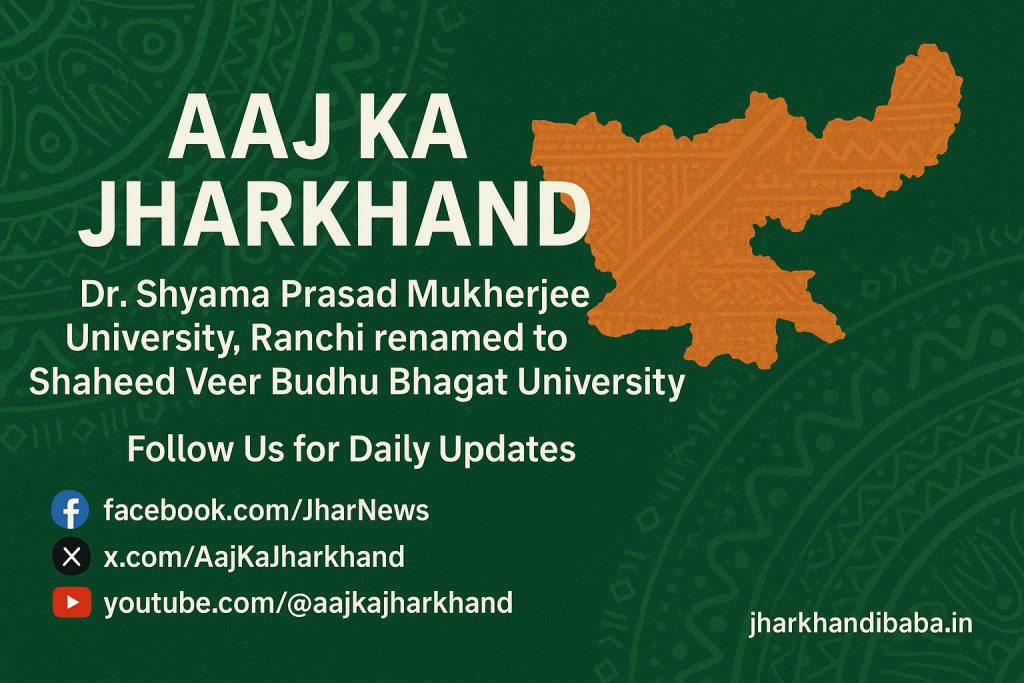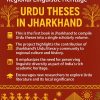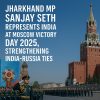The Jharkhand Government has officially changed the name of Dr. Shyama Prasad Mukherjee University, Ranchi, to Shaheed Veer Budhu Bhagat University. This move is seen as an effort to acknowledge the immense contribution of Budhu Bhagat, a tribal leader who led a valiant revolt against British colonialism in the 19th century.
🏛️ Cabinet Approval and Name Change Shaheed Veer Budhu Bhagat University
The Jharkhand Cabinet, led by Chief Minister Hemant Soren, passed a resolution to rename the state university after tribal hero Budhu Bhagat. The government said the move was part of a larger plan to promote tribal pride and restore forgotten freedom fighters to public memory.
However, opposition parties, especially the BJP, raised objections. They termed the move politically motivated and disrespectful to Dr. Shyama Prasad Mukherjee, a leader who played a crucial role in India’s post-independence integration.
📌 Points to Remember:
-
Jharkhand Cabinet renamed the university to honour tribal martyr Budhu Bhagat.
-
The move is part of promoting Adivasi history and identity.
-
Opposition leaders, especially from BJP, expressed sharp criticism.
-
Dr. Mukherjee is known for his role in integrating Kashmir with India.
-
The renaming reflects deeper socio-political shifts in state narratives.
Also Read: Top 10 Ancient Forts of Jharkhand must visit
👑 Life and Contribution of Budhu Bhagat
Budhu Bhagat was born on 17 February 1792 in Silagai village, located in the Chanho block of Ranchi district. He belonged to the Oraon tribal community and is best remembered for his leadership during the Kol Rebellion (1831-32), also referred to locally as the Larka Vidroh.
When British officers, zamindars, and moneylenders began exploiting tribals, Budhu Bhagat rallied local villagers and initiated guerrilla warfare. His resistance continued even after bounties were placed on him. On 14 February 1832, Budhu Bhagat, his sons, daughters, and followers laid down their lives in a heroic battle against British forces.
📌 Points to Remember:
-
Born in an Oraon tribal family in Ranchi district.
-
Led the Larka rebellion against British oppression.
-
Trained villagers in guerrilla warfare tactics.
-
Martyred in 1832 while defending his village from British troops.
-
His entire family, including two daughters, fought and died in the battle.
🔥 The Larka Rebellion – A Tribal Uprising
The Larka Vidroh was a massive tribal uprising led by Budhu Bhagat against British colonial officials, moneylenders, and local landlords. The movement symbolised the fight for self-respect, land rights, and freedom. British authorities responded with brutal force, using allied feudal rulers and battalions from nearby military stations.
Despite being outnumbered and poorly armed, Budhu Bhagat and his comrades displayed exceptional courage and patriotism. The rebellion, although crushed, left a lasting impact on tribal resistance movements.
📌 Points to Remember:
-
Larka Vidroh took place during 1831–1832.
-
It was fuelled by exploitation of tribals and forced labour.
-
Budhu Bhagat introduced guerrilla tactics among tribals.
-
British forces collaborated with local rulers to suppress the movement.
-
More than 150 followers attained martyrdom in the final battle.
🗳️ Political Reactions Across Parties
The decision led to a political storm in Jharkhand. Senior BJP leader Babulal Marandi strongly opposed the renaming, calling it an attempt to whitewash nationalistic contributions and play identity politics. He questioned the rationale behind removing the name of Dr. Shyama Prasad Mukherjee, who was a founding member of Bharatiya Jana Sangh and a national icon.
However, several Adivasi organisations supported the move, calling it a long-pending correction and a matter of regional pride.
📌 Points to Remember:
-
BJP calls the renaming act politically motivated.
-
Adivasi leaders support the decision as recognition of tribal sacrifice.
-
The issue has sparked social media debates and petitions.
-
Dr. Mukherjee’s contribution is tied to Kashmir and Indian unity.
-
Tribal icons are being brought into mainstream historical narrative.
📚 Why This Renaming Matters
This change is not just symbolic. It represents a shift in how India is recognising its unsung heroes, particularly from tribal backgrounds. Budhu Bhagat’s legacy, once confined to folk songs and oral history, is now institutionalised through education. It sets a precedent for more inclusive historical representation in public spaces and institutions.
📌 Points to Remember:
-
Recognises tribal contribution to India’s freedom struggle.
-
Budhu Bhagat becomes part of formal education and public memory.
-
Encourages regional pride and cultural representation.
-
Aligns with efforts to honour tribal icons like Birsa Munda.
-
Marks a significant decolonisation of academic institutions.



